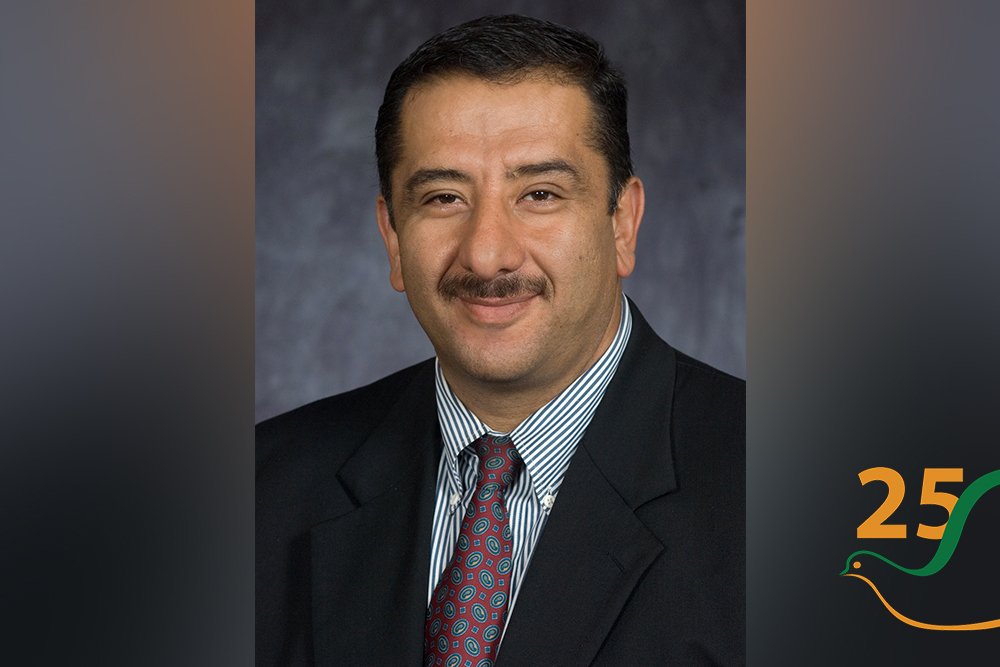During the 2019-20 academic year, as the Center for Justice and Peacebuilding commemorates its 25th anniversary, a series of guest authors will share reflections about CJP’s personal impact. We want to hear your thoughts, too! Thousands of people have intersected with CJP over the years, and each of you has contributed to the work of making the world more just and more peaceful. Join us for our anniversary celebration June 5-7, 2020. Visit the anniversary website for more details.
Read reflections by Phoebe Kilby, Maryam Sheikh, Sanjay Pulipaka, Howard Zehr and Ruth Zimmerman, and Shyamika Jayasundara-Smits.
***
My introduction to the Center for Justice and Peacebuilding community was in the early 1990s when I was in my early scholar-practitioner journey. Cynthia Sampson, a colleague from George Mason University’s School for Conflict Analysis and Resolution, and I started teaching the first course on religion and peacebuilding at the Summer Peacebuilding Institute (SPI). After that first encounter with amazing international and domestic participants who traveled from many conflict areas around the world, I kept coming back every year. The annual course allowed me to connect with wonderful team of faculty and administrators who were fully devoted to peacebuilding not only in the class but outside too. Creating a safe and empowering space for students and practitioners to learn from each other was a wonderful opportunity that I looked forward to every year.
The program’s faculty, all working at CJP, encouraged us to think out of the box and develop creative ways to work with peacebuilders in the classes. I learned not only new theoretical approaches but more importantly, I listened to stories from peacebuilders who became part of my professional and personal life.
As a result of my 14 years of SPI engagement, I continue to meet peacebuilders from around the world who are members of the CJP and SPI communities. The SPI community connected me to Sri Lanka, Mindanao, Pakistan, Iraq, Iran and many other countries.
Many programs around the world have been inspired by the work of SPI. It inspired me to launch a Peacebuilding and Development Institute (PDI) at American University in 1999, which brought many practitioners and students from around the world too. I have also worked with similar programs in Sri Lanka and Mindanao, Philippines. The model of CJP/SPI was crucial in launching and operating these three international programs.
Introducing cutting-edge topics in the academic program, creating a close and safe community in the summer program, and providing a space for professional development and networking are the obvious and most valuable contributions of CJP/SPI to both faculty and practitioners. In addition, the CJP/SPI contribution to the professionalization of the field of peace and conflict resolution is another important dimension that I recognize now.
The leading models of transformation and healing are only two examples that the CJP/SPI program injected in the field in late 1990s and early 2000. Additionally, the carving of a special space for the “reflective practitioner” methodologies as an integral pedagogical approach in the development of peacebuilding theoretical and applied frameworks is also important. I know from my experience in other academic institutions that such space is rarely provided or acknowledged institutionally.
Mentoring students who come from conflict areas is a major challenge for many US-based peacebuilding programs. Throughout my work in this field, I have encountered many CJP/SPI alumni who benefited from a strong mentorship and a network of relationships that facilitated their professional career and opened doors for them. Many of these graduates often mention the care and sensitivity they received from the time when they were at CJP/SPI.
In looking beyond the 25th anniversary, I believe that celebrating the growth in size and scope of the program is important. However, my hope is that CJP will intensify its efforts to sustain the above features: caring for people who come from violent conflict areas, enhancing its racial and religious diversity among faculty and students; and taking a more visible role in convening and connecting academicians, practitioners and activists in peacebuilding who are interested in advancing the field from social justice and strategic nonviolence frameworks.
Thank you for your commitment, leadership, and vision in developing CJP/SPI and all the other affiliated programs. I am lucky and privileged to be part of your community, too.
Mohammed Abu-Nimer is director of American University’s Peacebuilding and Development Institute. He has conducted interreligious conflict resolution training and interfaith dialogue workshops in conflict areas around the world, including Palestine, Israel, Egypt, Northern Ireland, the Philippines (Mindanao) and Sri Lanka. In addition to his articles and publications, Dr. Abu-Nimer is the co-founder and co-editor of the Journal of Peacebuilding and Development. He holds a PhD in conflict analysis and resolution from George Mason University and master’s and bachelor’s degrees from Hebrew University in Jerusalem.

I am director of the Project for Enhanced Global Understanding at Wyoming Seminary Upper School, an independent school in northeast Pa.
We designed a three year project where our Israeli and Palestinian participants study with us, a private school in Geryand a peace building school in Menashe, Israel- the Givat Haviva International School. Please feel free to contact me to share ideas.
Dr Abu Nimer is one of the most outstanding practitioners and thinkers in the field of peace building. So proud that you collaborate with him. David Augsburger